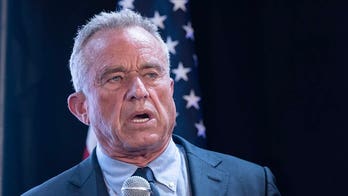WH: Option to tap strategic oil reserve on the table
Former Shell Oil CEO John Hofmeister weighs in
With the threat of $4-a-gallon gas once again hanging over the economy -- and over President Obama's re-election campaign -- the White House on Friday left the door open to tapping the country's oil reserve to ease prices.
"A release of the Strategic Petroleum Reserve is an option that's on the table," Deputy Press Secretary Josh Earnest told reporters.
The response was boilerplate, and Earnest added that he didn't "have anything to announce further on that topic at this point."
But Earnest also wasn't disputing a news report Friday claiming the White House was "dusting off old plans" for potentially releasing some of that oil. That claim, attributed to an anonymous source, was made in a lengthy Reuters piece that suggested a decision might come after Labor Day -- when officials can better gauge the trend in prices.
Lately, that trend has been ever-upward, and it's being felt at the pump. The average price of a gallon of regular Friday was $3.72, up 29 cents from last month.
That's a pinch on American consumers. But it's also a crimp in Obama's re-election efforts. Already dealing with a succession of dim labor reports and now a Republican opponent energized by his highly publicized running mate selection, Obama does not want to see the $4-a-gallon figure coming out of next month's Democratic National Convention.
The petroleum reserve, which he's tapped once before, could act as a political reserve of sorts in case gas prices climb too high. Administration officials, according to the Reuters article, are also worried that high oil prices could end up benefiting Iran, in turn undermining sanctions against the country.
Calls for tapping the petroleum reserve are cyclical, and typically lead to a predictable partisan dispute. Democrats have tended to favor tapping the reserve to allay high prices, while Republicans have used rising oil costs to argue instead for more domestic oil exploration and drilling.
Any decision at the height of campaign season, though, carries a political risk, as Republicans could accuse Obama of tapping the country's emergency supply for political purposes.
Earnest said Friday that the administration is "carefully" monitoring the oil market and price.
"It's something that we watch closely because of the economic consequences for changes in that market and changes in the price," he said.
He also noted that foreign oil imports have dropped in recent years -- though The New York Times reported Friday that the U.S. has been increasingly turning to Saudi Arabia for oil despite concerns about volatility in the region.





